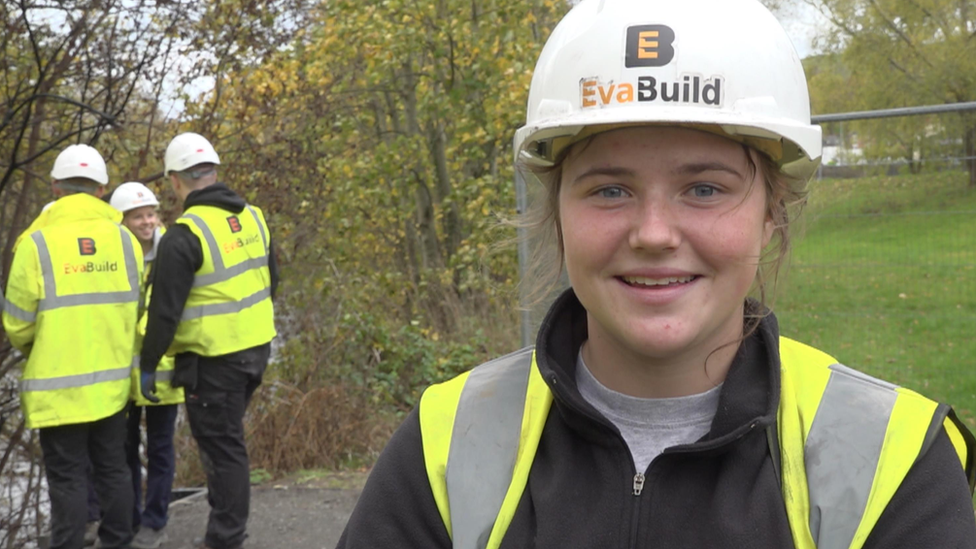Skills shortage: School leavers being taken on as apprentices
- Published

Employers want to train more young people like Joe, 16, because they are struggling to recruit skilled staff
An apprentice who didn't enjoy school is training with a firm directly recruiting school leavers as a skills shortage hits businesses across Wales.
Getting paid £5 an hour to learn a trade is "better than sitting at home doing nothing", said Joe Costorphine.
He is one of eight apprentices at EvaBuild, a groundworks firm in Newtown, Powys, that has struggled to recruit people with the right skills.
It found young trainees using a local college's new employment scheme.
"This is basically going to be our conveyor belt now for future people to come into the business and continue its success," said EvaBuild director Nick Evans.
Two-thirds of businesses in Wales that responded to a business barometer survey, external said they were facing skills shortages.
More than 70% said the shortages meant a higher workload for staff and reduced output, profitability and growth.
"Because of our geographical constraints here in mid Wales, the skill base is quite low," Mr Evans said.
"So we thought: there's one way to tackle this problem... recruit early."
Like other businesses in the area, EvaBuild is seeking help from Newtown College.
It is the latest in the NPTC group of colleges to get an "employment bureau", where employers come twice a week to meet with young people interested in training.

Nick Evans, from EvaBuild, says young people are not being given a "pathway" into construction jobs
Mr Evans said the difficulty in finding skilled employees was "across the board", stemming from a lack of apprenticeships "going back over two or three decades".
"What was prevalent probably going back to the 1980s died off and we're just not giving young people a pathway into the construction industry," he said.
EvaBuild went from having one apprentice to eight, including Joe from Llanfair Caereinion. The 16-year-old said he had an unhappy experience at school.
"I would say if you enjoy working outside or you don't like school, get an apprenticeship because you'll enjoy it, and you get paid while you do it," said Joe.
His fellow apprentice Katie, 16, said she had options when she finished her GCSEs but decided against staying on in school.

Katie says she could have done her A-levels but decide to try a career in construction instead
"I thought about maybe doing A-levels, and I just had this opportunity so I thought 'why not?'
"I go to college Monday, Tuesday, Wednesday, Thursday at Newtown doing bricklaying, block laying," she said.
"Then we come [on site] on a Friday. I like the groundworks, I like to be on the shovel and do stuff like that really."
The vice-principal of Newtown College said training young people like Joe and Katie will help to keep them in the area.

Newtown College vice-principal Gemma Charnock says they are trying to stop young people leaving the area for work and not coming back
"We started talking to local employers [who] felt they didn't have clear access to students to give them advice about the opportunities in Powys," she said.
"They felt this was adding to the real tragedy... young people leaving in droves across the border and not coming back to work and live in this county."
Chambers Wales, which represents businesses across Wales, said the skills shortage in the UK was "endemic and widespread".
The charity's most recent survey found 80% of Welsh businesses had difficulty recruiting for all jobs, from unskilled or semi-skilled labour to skilled manual work, as well as for professional or managerial roles.
"We have not yet seen a significant investment in skills from the UK and Welsh governments to attempt to resolve this vacancy gap," it said.
"Chambers Wales would like to see a robust response, commitment, and investment from both the devolved and national governments regarding skills infrastructure."
The Welsh government said its employability plan set out its "vision for a fairer and more equal Wales".
A spokesman said it had committed £1.4bn a year to delivering its Young Person's Guarantee, external in addition to £366m over the next three years for apprenticeships.
"We can't fully replace the missing millions lost through the fact that the UK government has not kept its funding promises to Wales following EU exit, although we have prioritised budgets to smooth the transition and to boost our investment in people and skills," the spokesman added.
The UK government's Department for Work and Pensions said it worked "closely with employers across Wales to fill their vacancies" and urged businesses to recruit locally through its Jobcentres.
"We are also helping people retrain and gain new qualifications to work in new sectors, especially where we are seeing high demand," a spokeswoman said.
- Published2 September 2021

- Published8 June 2021

- Published14 January 2021
